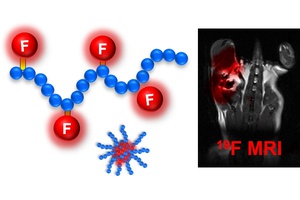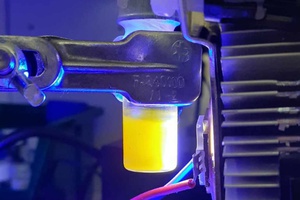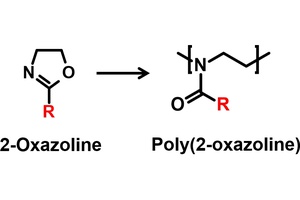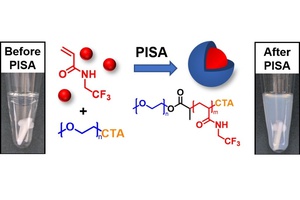
Fluorinated polymers for 19F MRI
We develop novel water-soluble fluorinated polymers as highly sensitive tracers in 19F magnetic resonance imaging (MRI). On this topic, we collaborate with the group of Prof. Daniel Jirak at …
We develop new polymerization methods to synthesize smart polymer materials for biomedical applications.
The main focus of our research is the development of highly functional polymer materials using modern synthetic methods, such as photocatalyzed controlled radical polymerization or cationic ring-opening polymerization of diverse monomers. Using such methods, we can obtain a wide range of well-defined polymers with different architectures (e.g., linear, branched, self-assembling block copolymers). In particular, we aim for stimuli-responsive polymers that change their physical properties based on an external stimulus (e.g., light, mechanical strain, change of temperature, pH). These „smart“ polymers are then used in biomedical applications, such as the preparation of drug delivery systems or cell-mimicking nanoreactors. The biological testing of our systems is realized in collaboration with several biological institutes.
For more information, see our webapage

We develop novel water-soluble fluorinated polymers as highly sensitive tracers in 19F magnetic resonance imaging (MRI). On this topic, we collaborate with the group of Prof. Daniel Jirak at …

Photocontrolled radical polymerizations are innovative techniques that use light to precisely control the polymerization process. By leveraging light as a stimulus, these methods allow for the fine-tuning of polymer architecture, …

Poly(2-oxazoline)s are a versatile class of synthetic polymers with tunable properties, and excellent biocompatibility. Their unique structure allows for precise control over molecular weight, hydrophilicity, and functionalization, making them highly …

We develop advanced nano/biomaterials by the modern technique of polymerization-induced self-assembly (PISA). PISA is a cutting-edge technique in polymer science that enables the formation of well-defined, nanoscale structures directly during …
(5 currently shown)